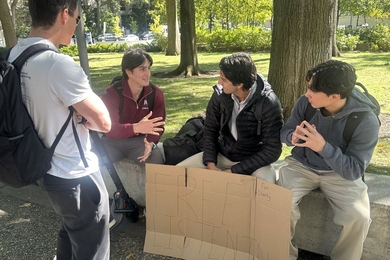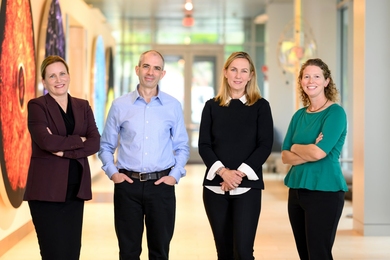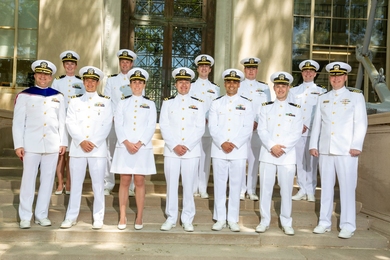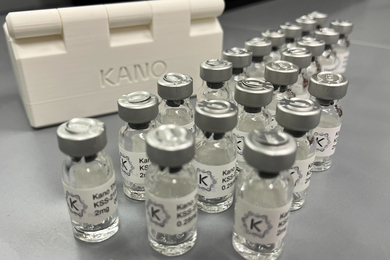Boston-area resident Carol Spaulding, 58, suffered from debilitating, daily migraines from the age of 11. Not only were they excruciating, but they caused dizziness, facial numbness, and finally led to severe depression and the loss of her job. Years of consulting with medical doctors and rounds of anti-depressant medicines did not help.
Out of ideas and desperate for relief, Spaulding consulted with Dr. Basmaa Ali, MBA ’09, founder of Zanjabee, a private integrative medicine and primary care clinic in Woburn, Mass.
“I had never heard of integrative medicine … I went in to see her and she spent an hour with me. I changed providers that day,” Spaulding says.
Ali suggested weekly acupuncture and massage therapy, and prescribed some herbal treatments. After some time, the headaches became less frequent. Next, Ali recommended Spaulding purge all processed foods from her diet — a move that eradicated the headaches almost completely.
“She didn’t tell me I ‘had’ to do anything … It was, ‘Let’s try this and see if it works.’ I think she is a wonderful combination of Western and Eastern medicine,” Spaulding says.
Ancient traditions
Ali’s route to becoming a medical doctor and business owner began with her childhood in Pakistan, where Ayurveda, or traditional Indian medicine, is woven into daily life. Ali became a doctor, specifically a hospitalist, a hospital-based physician who treats admitted hospital patients only. But she became frustrated when she realized she could not “fix” chronically ill patients. “They came in; we patched them up, and then we sent them out into the world. We knew for sure they’d be coming back,” she says.
Business school beckoned, Ali says, because she wanted to learn more about how to “get things done,” although it wasn’t until her second year at MIT Sloan that she considered opening her own practice. “I used to daydream about a place where you did both lifestyle and medicine, and at that point in time, they hadn’t integrated into one thing,” she says. After some initial hesitation, Ali forged ahead. “I thought, ‘What’s to stop me from doing this?’ The worst thing that will happen will be that I fail. But if there’s one thing that Sloan does very well, is that it removes your fear of failure. You fail? Big deal? You dust yourself off and start something new.”
After taking a system dynamics course with Professor John Sterman, Ali was inspired by his teaching. Ali says that Sterman demonstrated, among other things, that “good solutions strike a balance between short-term needs and long-term goals,” and that “there are no perfect solutions that provide both immediate gratification and long-term stability.” He also taught her not to be afraid of tackling hard problems.
Changing the world, one patient at a time
Following a period of research and consideration, Ali decided to open a clinic that would look at the patient as a whole person. The practice uses tools ranging from Western medicine to lifestyle modifications, Ayurveda, acupuncture and massage therapy to provide customized solutions for each patient.
The clinic’s name, Zanjabee, is a play on the word zanjabeel, which loosely translates to “elixir of ginger,” an herbal remedy that has been used as medicine for more than 1,000 years. “Today, there is a lot of cutting-edge research on ginger. We look at older traditions, but we also look at what’s cutting edge in medicine today,” Ali says.
Two students from the MIT School of Architecture and Planning helped her design the 3,500-foot, open-plan, light-filled practice, which opened in 2010 in Woburn, Mass., and is affiliated with nearby Winchester Hospital.
The practice has been growing steadily, but one of the biggest challenges for Ali has been getting the word out to prospective patients. She hired classmate Nadia Minter, MBA ’09, to assist in a part-time marketing role.
Both Minter and Ali agreed that word-of-mouth marketing has been most effective approach so far. Currently, Minter is putting together a direct mail campaign and is looking into community sponsorships with local sports clubs and parenting groups. She says her MIT Sloan MBA gave her marketing and business development knowledge, as well as an ability to think about creative ways to engage prospective patients.
Messaging has been a hurdle, says Minter. “Zanjabee offers several services such as primary care, acupuncture, Ayurveda, massage, and yoga, but it’s the customized combination of treatments and close collaboration of Zanjabee practitioners that makes it so different from other clinics that offer just primary care, or just acupuncture, or just massage,” she says. That difference can also make it more challenging to come up with a simple marketing slogan.
Another marketing challenge is the fact that some people are skeptical about the integrative medicine approach, although Ali notes that the practice, with its staff of seven practitioners, is definitely not opposed to Western medicine. “We really believe in Western medicine. We just recognize its limitations. We really want to find the best solution for the patient,” she says.
Out of ideas and desperate for relief, Spaulding consulted with Dr. Basmaa Ali, MBA ’09, founder of Zanjabee, a private integrative medicine and primary care clinic in Woburn, Mass.
“I had never heard of integrative medicine … I went in to see her and she spent an hour with me. I changed providers that day,” Spaulding says.
Ali suggested weekly acupuncture and massage therapy, and prescribed some herbal treatments. After some time, the headaches became less frequent. Next, Ali recommended Spaulding purge all processed foods from her diet — a move that eradicated the headaches almost completely.
“She didn’t tell me I ‘had’ to do anything … It was, ‘Let’s try this and see if it works.’ I think she is a wonderful combination of Western and Eastern medicine,” Spaulding says.
Ancient traditions
Ali’s route to becoming a medical doctor and business owner began with her childhood in Pakistan, where Ayurveda, or traditional Indian medicine, is woven into daily life. Ali became a doctor, specifically a hospitalist, a hospital-based physician who treats admitted hospital patients only. But she became frustrated when she realized she could not “fix” chronically ill patients. “They came in; we patched them up, and then we sent them out into the world. We knew for sure they’d be coming back,” she says.
Business school beckoned, Ali says, because she wanted to learn more about how to “get things done,” although it wasn’t until her second year at MIT Sloan that she considered opening her own practice. “I used to daydream about a place where you did both lifestyle and medicine, and at that point in time, they hadn’t integrated into one thing,” she says. After some initial hesitation, Ali forged ahead. “I thought, ‘What’s to stop me from doing this?’ The worst thing that will happen will be that I fail. But if there’s one thing that Sloan does very well, is that it removes your fear of failure. You fail? Big deal? You dust yourself off and start something new.”
After taking a system dynamics course with Professor John Sterman, Ali was inspired by his teaching. Ali says that Sterman demonstrated, among other things, that “good solutions strike a balance between short-term needs and long-term goals,” and that “there are no perfect solutions that provide both immediate gratification and long-term stability.” He also taught her not to be afraid of tackling hard problems.
Changing the world, one patient at a time
Following a period of research and consideration, Ali decided to open a clinic that would look at the patient as a whole person. The practice uses tools ranging from Western medicine to lifestyle modifications, Ayurveda, acupuncture and massage therapy to provide customized solutions for each patient.
The clinic’s name, Zanjabee, is a play on the word zanjabeel, which loosely translates to “elixir of ginger,” an herbal remedy that has been used as medicine for more than 1,000 years. “Today, there is a lot of cutting-edge research on ginger. We look at older traditions, but we also look at what’s cutting edge in medicine today,” Ali says.
Two students from the MIT School of Architecture and Planning helped her design the 3,500-foot, open-plan, light-filled practice, which opened in 2010 in Woburn, Mass., and is affiliated with nearby Winchester Hospital.
The practice has been growing steadily, but one of the biggest challenges for Ali has been getting the word out to prospective patients. She hired classmate Nadia Minter, MBA ’09, to assist in a part-time marketing role.
Both Minter and Ali agreed that word-of-mouth marketing has been most effective approach so far. Currently, Minter is putting together a direct mail campaign and is looking into community sponsorships with local sports clubs and parenting groups. She says her MIT Sloan MBA gave her marketing and business development knowledge, as well as an ability to think about creative ways to engage prospective patients.
Messaging has been a hurdle, says Minter. “Zanjabee offers several services such as primary care, acupuncture, Ayurveda, massage, and yoga, but it’s the customized combination of treatments and close collaboration of Zanjabee practitioners that makes it so different from other clinics that offer just primary care, or just acupuncture, or just massage,” she says. That difference can also make it more challenging to come up with a simple marketing slogan.
Another marketing challenge is the fact that some people are skeptical about the integrative medicine approach, although Ali notes that the practice, with its staff of seven practitioners, is definitely not opposed to Western medicine. “We really believe in Western medicine. We just recognize its limitations. We really want to find the best solution for the patient,” she says.





